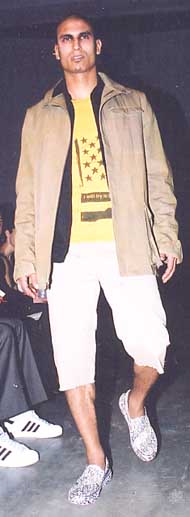  |

|
THIS PAGE: From the
Yoko Devereaux spring 2004 collection.
‘Media [are]
an illusion and a lot of people in the industry get
caught up in the illusion so much to the point that
they really donít focus on the design of the clothing’
|
|
|
Lucire: How did you meet Thomas?
Andy Salzer: I met Thomas when were both students in college
in Boston at age 18 or 19, and we immediately clicked. We share
many similar interests, especially our interest in fashion design
and I have known him probably longer than I have known anybody else.
Lucire: After those years in Boston, how did you
both ended up in New York City as the heads of a menswear fashion
house?
Andy Salzer: Thomas and I got along so well [from the beginning]
because we both love fashion. He loves design and I love the whole
image of the industry. I was always drawn more to the media side
in terms of it like pulling you in. I was very much affected by
that Ö the portrayal of something that you kind of knew no one was
really experiencing, that it was just a fantastic lifestyle. After
graduation, Thomas moved to New York City and I moved to Seattle
where I opened and operated two womenís retail stores for awhile.
I did that until I sold my half of the stores and moved on to starting
a fashion ecommerce company. I later moved to New York, sold the
ecommerce company and took a year off to decide what to do next.
The Yoko Devereaux project came along because
I wanted to stay in New York City and design and market a line the
way I think it should be done. The point was to create a collection
that isnít just solely purchased because of the label inside the
garment. After some discussion between the two of us, Thomas came
on board as the design director for the project.
Lucire: At the inception, did you have a firm
idea of who your customers were? Was it going to be primarily a
womenswear line? A menswear line? A combination of both? What was
the discussion in terms of your potential customer base?
Andy Salzer: Itís really funny that you asked that because
when we started, we initially thought we could concurrently design
both womenís and menís. Of course, itís a really good idea until
you realize that your staffing was limited to you and one
other person. Once reality set in, we stepped back from the idea.
Since we are both men and I honestly think that menswear has been
lacking any kind of infusion of something interesting, wearable
and still conceptual, we thought it would be more interesting to
do menswear. We would be speaking for ourselves and our personal
needs seeing that we have been having a hard time filling
that void in our own closets with what was out there.
Lucire: Your designs are inherently youthful and
individualistic. Is that your personal reaction to the mega-brands
or is that your own mindset?
Andy Salzer: I think itís actually a little bit of both.
On one hand, we were reacting to the changing of the guard in fashion.
And itís not that it has completely gone from one end of the spectrum
to the other, but in the last few years, there has been this movement
of fashion being redefined.
Lucire: In what way?
Andy Salzer: Well, the old guard of fashion concentrated
on the wearability, the fit, the fabric, and to a lesser extent,
the brand name. There was a genuine concern about the garment itself
and how amazing it could be. On the other hand, fashion now is taking
a turn towards somewhat undefined creativity, the more "creative"
you look, the more fashionable you are considered to be. You see
a lot of independent designers who have completely thrown out the
rules of fashion, trying to reinvent the wheel. But there is a lot
to be said about the old-guard approach to fashion. I like things
to be wearable. I think fashion should still be approachable in
some ways. Our belief is that a lot of the menswear designs now
out in the market-place lacks creativity. Unlike the progression
in the womenswear sector of the market, the history of menswear
hasnít really changed that much in 200 years. Itís still a very
rigid code of dress. I think what we are trying to do at Yoko Devereaux
is to find a workable balance between the two schools of thought.
CONTINUED

|